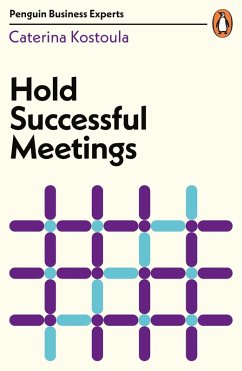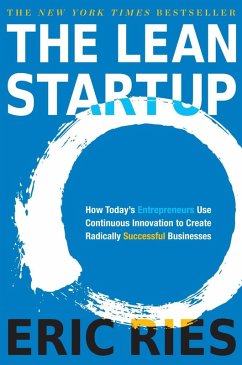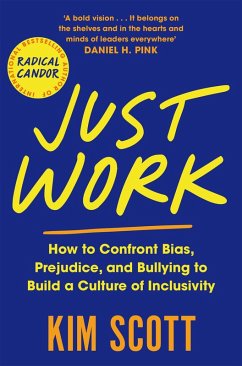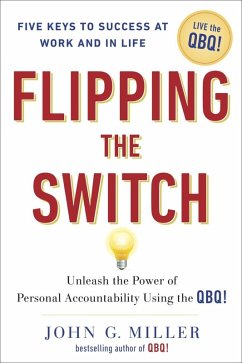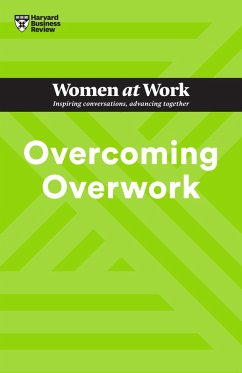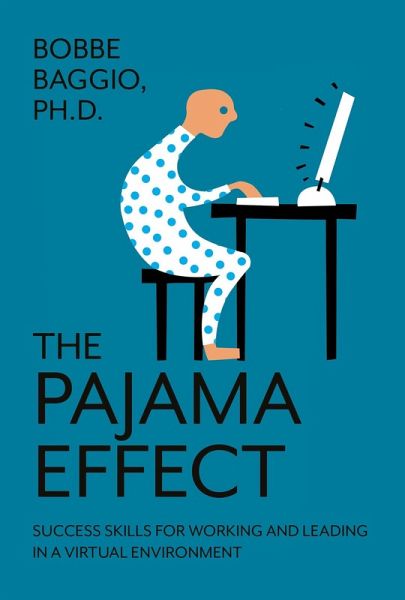
The Pajama Effect (Humans@WORK, #1) (eBook, ePUB)
Versandkostenfrei!
Sofort per Download lieferbar
9,49 €
inkl. MwSt.
Weitere Ausgaben:

PAYBACK Punkte
0 °P sammeln!
Increasingly available new technologies and ways to connect have caused radical changes in the ways humans communicate, blurring the lines between different aspects of life. The Pajama Effect is the result of these changes. It describes a psychological and behavioral shift human beings experience when working in a physically detached and virtually connected world. This change puts them out of their element and vulnerable to a new environment, isolation and other challenges.The economics of the 21st century has inspired companies and organizations to embrace the virtual environment to both incr...
Increasingly available new technologies and ways to connect have caused radical changes in the ways humans communicate, blurring the lines between different aspects of life. The Pajama Effect is the result of these changes. It describes a psychological and behavioral shift human beings experience when working in a physically detached and virtually connected world. This change puts them out of their element and vulnerable to a new environment, isolation and other challenges.
The economics of the 21st century has inspired companies and organizations to embrace the virtual environment to both increase productivity and lower costs. Digital technologies have given us increased speed, connectivity and independence. These advances offer us a more flexible and mobile way to work and live, yet the impact of these technologies on human beings is only beginning to be understood. The digital age came upon all of us with excessive speed. The rate of change and adaption is unlike anything we have ever seen, and that rate of change is increasing.
The online world has little respect for time, space and place. The 9-to-5 day no longer applies in a 24/7/365 world. It is difficult to know when work stops and play starts, or when to call it a day and say, "Enough is enough." People work from home, cars, hotels, and just about anywhere in increasing numbers. Telecommuters and workshifters have grown in number to more than 50 million workers and that is probably an underestimation. This also impacts learning, schools and training. Almost no industry is impervious. Even if you are a landscape contractor, with teams of people digging in the dirt, chances are you connect remotely and use technologies to accomplish some of what you do. The tools that connect us, and how we use them, are limited only by our imaginations. This ability to connect from anywhere with anyone is now part of our social fabric. We are all becoming a part of a technologically connected global culture that blends work, play and learning online. This affects every facet of our lives.
We are more connected and we are more mobile. We have access around the clock to colleagues, friends, family and shopping. All of this connecting has increased distractions. People are texting when driving, in meetings and in the checkout line. We need many conversations about what is appropriate and when, yet those discussions seem to be missing from our daily lives. The same scenes play out in restaurants, meeting rooms and homes: instead of focusing on being out to dinner with our significant other, we are on a cellphone, responding to a client; instead of listening during a meeting, we are texting our kids; instead of relaxing on the sofa, we are checking work emails.
Thanks to these technologies, the norms governing how we interact with coworkers, friends, family and society are also changing. The Pajama Effect has altered the expectations and approaches that came with us from the industrial age. There are conscious and unconscious elements at play in the virtual world. It is quite possible for virtual workers to be more productive, more relaxed and more in control of their lives but it is also possible for the exact opposite to occur.
It all depends on how each individual thinks and behaves - on the ability to respond and not just react. Distractions abound in the virtual environment, from advertisements, websites, social media and video everywhere to family obligations and love. The virtual environment can pull you off task and out of your element. To be successful working and leading in this new environment, you need to possess certain abilities. There will still be only 24 hours in a day, and 7 days in a week, and 365 days in a year.
The economics of the 21st century has inspired companies and organizations to embrace the virtual environment to both increase productivity and lower costs. Digital technologies have given us increased speed, connectivity and independence. These advances offer us a more flexible and mobile way to work and live, yet the impact of these technologies on human beings is only beginning to be understood. The digital age came upon all of us with excessive speed. The rate of change and adaption is unlike anything we have ever seen, and that rate of change is increasing.
The online world has little respect for time, space and place. The 9-to-5 day no longer applies in a 24/7/365 world. It is difficult to know when work stops and play starts, or when to call it a day and say, "Enough is enough." People work from home, cars, hotels, and just about anywhere in increasing numbers. Telecommuters and workshifters have grown in number to more than 50 million workers and that is probably an underestimation. This also impacts learning, schools and training. Almost no industry is impervious. Even if you are a landscape contractor, with teams of people digging in the dirt, chances are you connect remotely and use technologies to accomplish some of what you do. The tools that connect us, and how we use them, are limited only by our imaginations. This ability to connect from anywhere with anyone is now part of our social fabric. We are all becoming a part of a technologically connected global culture that blends work, play and learning online. This affects every facet of our lives.
We are more connected and we are more mobile. We have access around the clock to colleagues, friends, family and shopping. All of this connecting has increased distractions. People are texting when driving, in meetings and in the checkout line. We need many conversations about what is appropriate and when, yet those discussions seem to be missing from our daily lives. The same scenes play out in restaurants, meeting rooms and homes: instead of focusing on being out to dinner with our significant other, we are on a cellphone, responding to a client; instead of listening during a meeting, we are texting our kids; instead of relaxing on the sofa, we are checking work emails.
Thanks to these technologies, the norms governing how we interact with coworkers, friends, family and society are also changing. The Pajama Effect has altered the expectations and approaches that came with us from the industrial age. There are conscious and unconscious elements at play in the virtual world. It is quite possible for virtual workers to be more productive, more relaxed and more in control of their lives but it is also possible for the exact opposite to occur.
It all depends on how each individual thinks and behaves - on the ability to respond and not just react. Distractions abound in the virtual environment, from advertisements, websites, social media and video everywhere to family obligations and love. The virtual environment can pull you off task and out of your element. To be successful working and leading in this new environment, you need to possess certain abilities. There will still be only 24 hours in a day, and 7 days in a week, and 365 days in a year.
Dieser Download kann aus rechtlichen Gründen nur mit Rechnungsadresse in A, B, CY, CZ, D, DK, EW, E, FIN, F, GR, H, IRL, I, LT, L, LR, M, NL, PL, P, R, S, SLO, SK ausgeliefert werden.




